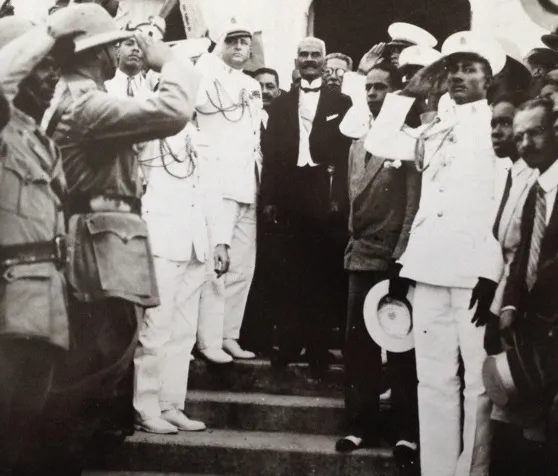He was elected President of the Republic on April 21, 1930, by the Council of State to organize the legislative and presidential elections. Louis Eugène Roy was a well-known and respected figure in business circles, a man of discreet, compassionate, and gentle character.
The new president was admired by the nationalist bourgeoisie of the upper class and the working classes of the capital. On May 15, 1930, Louis Eugène Roy took possession of his office. Massed in front of the cathedral, drunk with joy and passion, the people of Port-au-Prince wanted to celebrate the newly elected, the new president, the hero of the day.
Roy, 69 years old, is not a politician but a pharmacist who studied in France in Montpellier, a businessman who had consistently earned his living as a broker and stockbroker at the Port-au-Prince Stock Exchange.
He is a claw with delicate features, a handsome man, slender with a dignified look which, with his eternal bow tie and white suit, displays his dignity of life, moderation, simplicity, bonhomie, natural assurance, and austere refinement.
He is a bearer of hope and peace at a difficult time in national history. He is recognized everywhere as an honest man, a man of rigor, good sense, and word. Rarely has a political event aroused such powerful public interest as the advent of Louis Eugène Roy to the presidency.
Louis Eugene, a people President
He created enthusiasm around his person and his ministers, Rodolphe Barrau, Frédéric Bernardin, Ernest Douyon, Franck Roy, and Damoclès Vieux, indicating he intended to remain in office only as long as it took to organize the legislative and presidential elections.
Everything pointed to the end of the Occupation. Still, Roy did not want to precipitate the overthrow of the old institutional rules or their sudden collapse in these times of calamity.
It is worth noting that while the new president was bathing in the working-class neighborhoods, he ordered the reopening of the Cercle Bellevue. The Cercle Bellevue is the club of the upper-middle class of Port-au-Prince.
It had been closed down militarily by the Treaty officials because its members had refused to allow American officers into their salons. The decision to open the club was to be welcomed by the public as a timely and significant gesture. That gesture marked the return of the independence of the Haitian authorities.
To the great disappointment of the stunned opposition, Roy did not dismiss the Council of State. It should be remembered here that the president is a moderate, an independent man who took the time to reflect on measuring the stakes.
Nourished by noble and generous feelings and very aware of the requirements of his mission, Roy preferred to remain in strict compliance with constitutional procedures and established principles.
He refused to give in to the most tempting political proposals of the sirens who wanted him to stay in power for another year or two. The fragility of the democratic instruments forced this intuitive to proceed to their quiet, serene, and peaceful remaking.
In the meantime, President Roy dealt with current affairs. On September 15, 1930, he proceeded to the solemn inauguration of the École Militaire. He received an American commission chaired by a black educator, Mr. Robert R. Molton, who had come to investigate the situation of public education in Haiti.
He organized relief efforts for the city of Santo Domingo, which had recently been devastated by a hurricane, and finally reduced the tax on alcohol by two-thirds.
Indeed, the Tobacco and Alcohol Law proved to be the hottest issue, especially after the Marchaterre tragedy highlighted the importance of the social problems too often forgotten in rural Haiti.
But Roy had only one major priority: the peaceful transition of the regime. He had the Council of State pass the Electoral Law and set the elections for October 14, 1930.
Under this law, members of the electoral commissions are appointed by lot from among the candidates’ representatives. The state will pay these independent citizens and not be accountable to the government.
These rules are clear, honest, and satisfactory to both candidates and parties. The 1930 legislative elections were among Haiti’s most accessible and most democratic ever held.
No one could hope to win his seat with the government’s help, as the competitors’ success at the polls depended on their popularity and the efficiency of their political organization.
Carried by the nationalist wave, these legislative elections were to bring several politicians from the patriotic leagues into the upper and lower houses.
Their names were Descartes Albert, Jean Bélizaire, Jean-Baptiste Cinéas, Charles Fombrun, Dumarsais Estimé, Price Mars, Louis Saint-Surin Zéphirin, Etzer Vilaire, Horace Bellerive, Edgar Pierre-Louis (a nephew of Firmin), Edgar Néré Numa, Joseph Jolibois fils, etc.
Most of them had a parliamentary career that lasted a little over twenty years.
Last Updated on November 10, 2023 by kreyolicious


